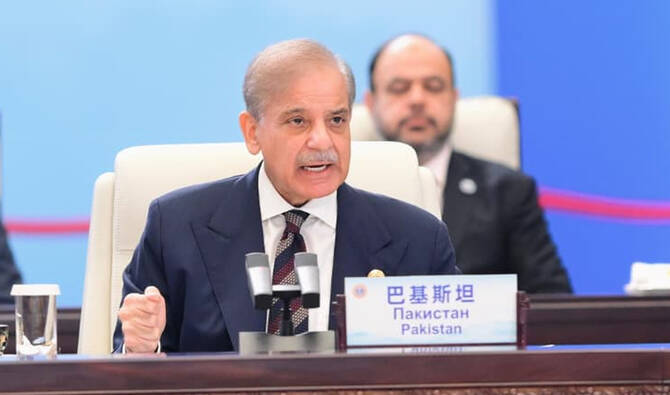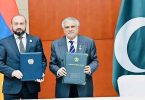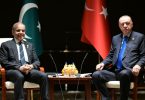F.P. Report
TIANJIN : Prime Minister Shehbaz Sharif, addressing the Shanghai Cooperation Organization (SCO) summit in Tianjin, warned that undeniable evidence points to foreign involvement in terrorist attacks in Balochistan and Khyber Pakhtunkhwa, including that on Jaffar Express.
He stressed that terrorism and extremism threaten the entire region and called for holding perpetrators and facilitators accountable.
Evidence of foreign involvement in Pakistan terror attacks
The premier said that some countries have been using terrorism as a political weapon, but their “false narratives” no longer hold credibility. “Those responsible for these heinous crimes must be held accountable,” he added, highlighting Pakistan’s sacrifices in the war on terror, where more than 90,000 lives were lost.
Dialogue for peace in South Asia
Shehbaz Sharif emphasized that Pakistan seeks dialogue, not confrontation, with its neighbouring countries. He underscored the need for comprehensive talks to achieve lasting peace in South Asia, while reaffirming Pakistan’s respect for the sovereignty and territorial integrity of SCO member states.
“Pakistan has always believed in the power of multilateralism, dialogue and diplomacy. Nothing is more important for any country than sovereignty and territorial integrity. We also honour all international and bilateral agreements,” the PM stated.
The prime minister also stressed the importance of a stable Afghanistan, terming it crucial for regional peace and prosperity. He told the meeting that Pakistan was strengthening relations with the Afghan leadership, adding that through good relations, Islamabad could take Kabul along as a good neighbour and economic partner.
He also expressed hope that trilateral engagements would help strengthen Pakistan-Afghanistan relations.
Support for Palestine, condemnation of Israel
Reiterating Pakistan’s long-standing stance, Shehbaz Sharif strongly condemned Israel’s aggression in Gaza and emphasized that the two-state solution approved by the United Nations remains the only path to sustainable peace in the Middle East. He said the humanitarian crisis in Gaza is “an unending wound on our collective conscience.”
“Israel’s unjustified aggression against Iran is both condemnable and unacceptable. Pakistan believes that comprehensive dialogue can resolve long-standing disputes,” insisted Shehbaz.
Praise for China, regional cooperation
Acknowledging China’s role, the premier lauded President Xi Jinping’s visionary leadership and hailed the China-Pakistan Economic Corridor (CPEC) as a practical model of cooperation. “Unhindered access to water as per the agreements will further strengthen the objectives of SCO,” he noted.
He praised Tianjin for symbolising China’s cultural and economic spirit and playing the role of a bridge for civilisations and cultures. He also noted that SCO reflects Pakistan’s long-standing commitment to promoting regional cooperation and integration.
Pakistan’s resilience amid climate, economic challenges
Shehbaz Sharif also drew attention to the heavy rains, cloudbursts, devastating floods and climate challenges Pakistan faces due to global warming. Despite this, he highlighted Pakistan’s “impressive economic recovery” over the past 18 months, citing reduced inflation, a current account surplus, and a rising stock market.
The premier highlighted that floods had claimed precious human lives in Pakistan and caused severe damage to infrastructure, property, crops and livestock. “We are paving the way for new hope to recover from the devastation of the floods.”
The prime minister concluded by reaffirming Pakistan’s unwavering commitment to the UN and SCO Charters, urging all 3.5 billion people in member states to work collectively for peace, stability, and prosperity.
Later, the SCO issued its Tianjin Declaration following the 25th Council of Heads of State meeting, emphasizing respect for sovereignty, non-interference, and stronger cooperation for regional stability. Leaders also pushed for reforms in the United Nations to better represent developing countries.
The declaration stressed that SCO member states will respect the sovereignty, independence, and territorial integrity of all nations. It reaffirmed the principle of non-interference in internal affairs and rejected any form of intimidation or threat.
Leaders highlighted the need to deepen cooperation in areas of security, economic development, and cultural exchange to ensure peace and stability across Eurasia.
Call for UN reforms
A major theme of the declaration was the urgent need to reform the UN to reflect “modern political and economic realities.” Member states underlined that developing countries must be given greater representation in UN decision-making bodies.
The SCO urged adaptation of the UN system to strengthen its role as a central platform for global cooperation and collective security.
Rejection of bloc confrontation
SCO countries collectively rejected confrontational and bloc-based strategies at both regional and global levels. Instead, they endorsed cooperation to build an “equal and indivisible security architecture,” ensuring stability through inclusivity rather than division.
The declaration also reaffirmed the “Shanghai spirit” of mutual trust, equality, respect for cultural diversity, and common development. Leaders called for sustainable progress in Eurasia by fostering shared security and closer political and economic ties.







